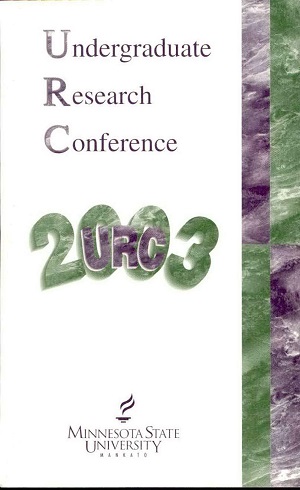The Influence of People's Anticipated Outcome on Their Information Seeking Behavior
Location
CSU
Student's Major
Psychology
Student's College
Social and Behavioral Sciences
Mentor's Name
Edison Perdomo
Mentor's Department
Psychology
Mentor's College
Social and Behavioral Sciences
Description
The attempt of this study is to experimentally clarify whether or not people avoid potentially abrasive information about themselves and/or seek ego boosting information regarding themselves. Subjects consisted of Minnesota State University Mankato students, most of whom were freshmen. Surveys, purportedly testing subjects' levels of morality, were given to determine if there was any correlation between subjects' estimated score on a morality test and their desire to know their score (information seeking). Past studies have investigated the influence of individual's levels of uncertainty, tolerance for uncertainty, and their importance placed on knowledge, all relative to their desire to obtain the specific information. However, very little investigation has been made into the relevance of a subject's anticipated outcome on their desire to seek the information. The results of this study could be applied to tackle a much larger analogous issue; why patients who really need to seek medical attention are often less likely to visit the doctors than healthy patients.
The Influence of People's Anticipated Outcome on Their Information Seeking Behavior
CSU
The attempt of this study is to experimentally clarify whether or not people avoid potentially abrasive information about themselves and/or seek ego boosting information regarding themselves. Subjects consisted of Minnesota State University Mankato students, most of whom were freshmen. Surveys, purportedly testing subjects' levels of morality, were given to determine if there was any correlation between subjects' estimated score on a morality test and their desire to know their score (information seeking). Past studies have investigated the influence of individual's levels of uncertainty, tolerance for uncertainty, and their importance placed on knowledge, all relative to their desire to obtain the specific information. However, very little investigation has been made into the relevance of a subject's anticipated outcome on their desire to seek the information. The results of this study could be applied to tackle a much larger analogous issue; why patients who really need to seek medical attention are often less likely to visit the doctors than healthy patients.




